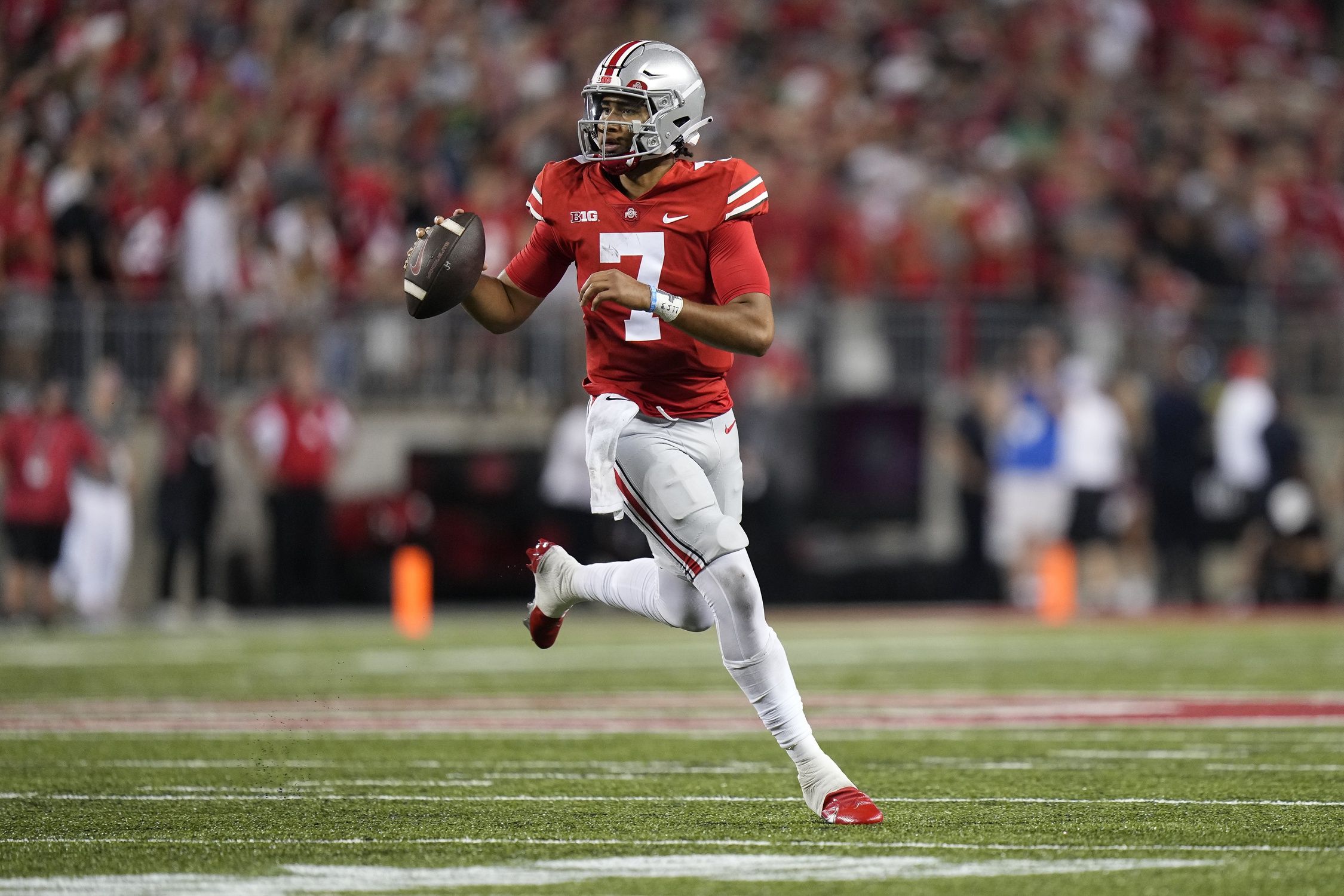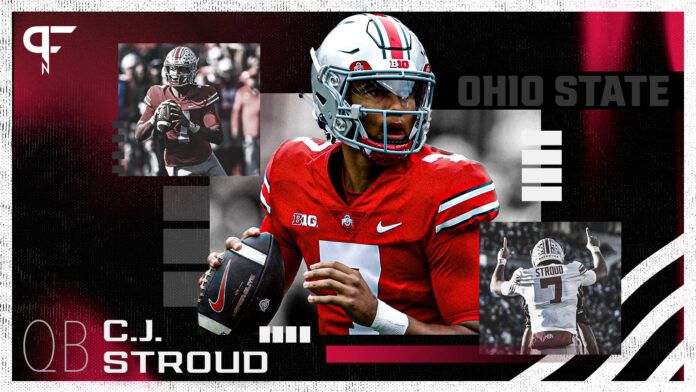Inevitably, when C.J. Stroud’s name is called in the first round of the NFL Draft, the football-watching world will be treated to another draft story of adversity through tragedy.
Often, these are not stories about players but about things that happened to players, wrapped up in a narrative of how to overcome. But Stroud’s character is more proactive than a passive recipient of disaster who fights through adversity. In many ways, it resists the atomized narrative — instead of heroizing himself in his story, Stroud surrounds himself in community.
As he learned from his dad, “It’s not about the bad.”
C.J. Stroud Was a Latecomer to the Scene
That doesn’t mean Stroud isn’t proud of himself. He entered the Elite 11 camp as an unheralded recruit and outcompeted four- and five-star quarterbacks to win camp MVP — a story he tells with relish and pride. But he also admits his doubts and fears.
On the Pivot Podcast, Stroud shared his Elite 11 story and his doubts, saying, “Like, at first, I didn’t have a lot of confidence going in. Like, these dudes probably can sling it and going out there man, like, they can’t really hold me a little bit! So like, I just felt like, Okay, God, like he this is what he called me to do.”
His recognition of his ability is consistently tempered with his support for those around him. As he finished his story about the Elite 11 camp, he said, “I just kept going and kept going, kept building and kept persevering through my issues at home and whatnot. My mom has always been there. My brother’s been there, my sister, and they always have my back whether with football or without.”
Stroud is proud of who he is, refusing to take offers from California schools because they were late to the party. Both USC and UCLA had been recruiting Bryce Young and D.J. Uiagalelei for years. Stroud appeared on their radar two weeks before signing day.
“I’m not third to nobody, you know what I mean?” he told Ryan Clark. “I think God blessed me with just as much talent or even more. So, I hold myself to a certain standard. And I’m not saying they don’t hold that standard, but I wanted something better for myself.”
It frustrated him to see other Southern California quarterbacks earn early success, but to get through that, he took another aphorism from his father: “Comparison is a thief of joy.”
MORE: FREE NFL Mock Draft Simulator (With Trades)
Young and Uiagelelei had the advantage that many top Southern California quarterback recruits had — private quarterback coaching. Stroud did not and didn’t start in his freshman or sophomore years of high school to get on scouting radars.
As a junior, his team started out the season with four consecutive losses before rattling off six straight wins to make the playoffs and winning their first-round game in overtime.
For Stroud, the cycle has consistently involved setbacks, community, opportunity, and growth.
C.J. Stroud’s Story Is Both Common and Impressive
It’s difficult to tell Stroud’s story while dancing around his circumstances. Stroud’s father was deeply involved in his life and began coaching his son in basketball and football at five years old. He would teach Stroud after hours how to throw and shoot and would sign him up regularly for leagues and attend those games.
Eight years later, he was in prison for carjacking, robbery, kidnapping, and misdemeanor sexual battery after maintaining a clean record over the previous 20 years. His sentence was 38 years, in part due to California’s Three Strikes Law.
Now Stroud was left with a choice — his father’s legacy had been to guide his thinking and instill in him the value of athletic performance. In many ways, Stroud’s identity was inseparable from what his father gave him.
Cordoning off that part of himself didn’t help. As Ross Dellenger in Sports Illustrated reported, coach Willie Munford asked about Stroud’s father once after the arrest and never again. Stroud chose not to talk about it, and that season weighed heavily on him. Stroud had all of the physical skill but didn’t play up to his — or coach Munford’s — standards.
Losing his father meant a plunge into poverty for the family, with all the attendant crises. In a system without guaranteed housing, the Strouds were under the constant threat of eviction. In a system without guaranteed access to food, the Strouds struggled to find nutritious meals on a regular basis. And in a system without consistent health care, Stroud was playing without a contact lens in one of his eyes.
And though it’s impressive that Stroud was able to accomplish all that he did, it’s easy to run the risk of celebrating personal perseverance at the cost of recognizing the problem.
Every heartwarming human interest story in america is like "he raised $20,000 to keep 200 orphans from being crushed in the orphan-crushing machine" and then never asks why an orphan-crushing machine exists or why you'd need to pay to prevent it from being used.
— Anosognosiogenesis (@pookleblinky) September 25, 2020
Indeed, the Strouds learned the value of community. When his mother learned of the contact lens issue, she asked why he didn’t say anything. He told her that she had enough on her plate. As she detailed to Sports Illustrated, coaches raised money to provide him with a year’s worth of lenses. “It takes a village,” she said.
Even Stroud’s eventual commitment to Ohio State was a community effort. After a standout performance at The Opening — a Nike camp event that preceded the Elite 11 quarterback camp — the young quarterback impressed receivers Julian Fleming and Jaxon Smith-Njigba enough to call Ohio State head coach Ryan Day to get their eyes on Stroud.
Smith-Njigba told The Athletic, “I said [to Ryan Day], ‘We need to get this guy. He’s special.'”
C.J. Stroud’s Elite 11 Experience Was a Template
Stroud didn’t leave the Opening with an invite to the Elite 11 camp like other quarterbacks did. He needed to go to another regional camp and prove himself there before they would extend an invite. He traveled to Oakland for that opportunity and earned it. After that, his success at the Elite 11 would come with a sudden explosion in offers from Power Five programs.
But again, Stroud didn’t have the strongest start at the quarterback camp. And so he sought out his community resources — Elite 11 quarterback coach Jerrod Johnson and mindset strategist and chess player Seth Makowsky. The post-camp notes on the quarterback noted that Stroud was the “hungriest kid” there, according to The Athletic’s Bruce Feldman.
He spent “every waking hour” with either Johnson or Makowsky, figuring out how to train his craft or his mind. The process of reorganizing his thoughts, he said, turned him into a much more complete quarterback.
As a result, Stroud didn’t succumb to the temptation often felt in quarterback camps to always find the big play. He kept the ball off the ground and kept the completions coming. He reframed what a successful play was and committed to it, earning Elite 11 MVP honors along the way.
Stroud has become a methodical yet inventive quarterback. But more than that, he’s always been improving. He had trouble seeing the field with so many talented quarterbacks ahead of him at Ohio State and then struggled when he first earned the job.

His first three games were a big concern, but he finished his Ohio State career with one of the best quarterback performances — win or lose — we’ve seen in a title game against one of the toughest defenses college football has to offer.
His progression throughout his college career has seen a tight release become even more efficient, his decision-making turning from smart to brilliant, and his capacity for improvisation turning from timid to terrifying.
MORE: When Is the 2023 NFL Draft?
From the moment he reshaped his understanding of the game at the Elite 11 camp to the end of the run for the championship, Stroud learned to mix aggression with care — not just in the areas where he chooses to throw, but how he throws. He adapts every throw to the situation the pass calls for, whether that’s high-velocity, tight-window aggressiveness, or touch needed to lob over a linebacker to lead a receiver past the down marker.
After Ohio State fans saw potential disaster at the beginning of Stroud’s career, the end of it finished with one of strongest scouting reports a prospect could put together, with minor and nitpicky weaknesses dotting the profile.
He struggled, connected with his community, saw an opportunity, and grew.
C.J. Stroud’s Journey Meant Confronting Himself
Struggling with being proud of the man his father helped him become and the resentment he had for his father weighed on Stroud, but he ultimately found a way to live with himself and the feelings he had for his dad. On the Pivot Podcast, Stroud opened up about his father, saying, “I hated my Pops, to keep it real. Like I was like, man, how could you just leave me like that?”
As a pastor’s son, Stroud grew up around the church and around the community. “I probably didn’t have a Christmas or Thanksgiving where I wasn’t giving, wasn’t going to the community trying to help,” he said. But when his father left his life, Stroud left the church. “I was bitter, I was — I didn’t want to know anything. I don’t want to go to church, none of that,” he explained.
Teammate Kamryn Babb, a receiver for Ohio State, brought Stroud back to church, where he broke down crying. Shortly thereafter, he finally called his dad after years of silence. “It’s nothing but love. He just loved me as a son.”
That’s how Coleridge Stroud IV — Coleridge Junior, or C.J. — reconciled with Coleridge Stroud III.
“I got as far as I did — I’m the fourth in my family, I’m his junior, you know what I’m saying?”

C.J. Stroud is inseparable from Coleridge III.
And he embraced that with the help of the community around him. Stroud learned about forgiveness from his father and later used that lesson to forgive him.
Along the way, he learned some tough lessons about the structures that made struggle inevitable in the first place. He talked about how much more difficult it is for Black men to succeed and the expectation that they become more than their surroundings.
He talked about how a family who helped build homes was rendered nearly homeless because of the excessive penalties given to Black people and the inability of the system to recognize the need.
And he talked about how his story isn’t completely his story. These are systemic problems and ones he can’t solve by himself. He couldn’t overcome it without the people around him. So, in the meantime, he took a lesson from his dad.
“It’s not about the bad.”

